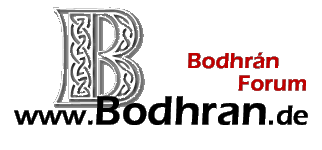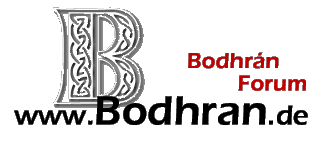Hallo liebe forum genossen, mein Deutsch im schreiben ist nicht so gut so ich gehe weiter in English.
What I wanted to ask the forum members is the following; what do they think about cajon's and Irish music. For some time now I see cajon's entering sessions and in my humble opinion (and that's stricktly personal) I don't realy like them. I think first of all that a Bodhran has to be played humble in service of the melody instruments without taking the lead and being a solid background or fundament for the tune. I see often now a cajon that over-rules the session with sharp beats and is realy at the centre of attention which isn't so pleasant to hear. I hope I don't offend any-one and especially those who play cajons. I think its a great instrument but honest believe that I find it difficult to hear it in an Irish setting. Recently I'm seeing Bodhran players that chanced their instruments in favour of cajons. Is this a normal evolution in music or should we stick to our beloved Bodhran? Please comment without being offensive towards those who play them! All the best from Belgium.
Ron
Cajon's in Irish music
-
-
Hi Ron,
first thing: Cajons are obviously nice things to sit on.
I started on the cajon some months ago (though I can't arrange for enough time to practise enough on both bodhrán and cajon). I like the sounds, but I do agree with you in that it does not really belong into Irish trad as played in a session.
Whoever wants to use it in band play or stage performances is quite welcome to do so as far as I'm concerned. Cormac Byrne of Uiscedwr is a proper example, I daresay.
Cheers,
Uwe -
Nice comment, Uwe, hope to visit the fiddler one day!
-
Guys,
that's exactly what I think. Even Cormac was the first one coming to my mind, too.
A (well played) Cajon on stage for a couple of tunes is fine. But please leave it at home when you're joining a session. Call me old fashioned, but it doesn't have anything to do with Irish music (same goes for Bongos, Congas, Djembes, Didgeridon'ts, Alphorns or Synthesizers...). And - as Ronnie said - in the wrong hands it is way too loud and can easily over rule the other instruments. But in a well thought band arrangement, I like it very much.
There are a couple of really good Cajon players out there (like Cormach or Holly Ries to name but two), who know Irish music pretty well and who even know the secret of dynamics in music (i.e. know that there's something between not playing at all and firing off the loudest possible noises). But in the end it is somewhat similar to the bodhrán: Some people buy a cheap cajon, practice for two hours (bumm-tchik-bumm-bumm-tchik) and then hold themselves for session-ready...
Where's the problem, you might ask?! Well - it's destroying the fun for 90% of the other musicians...
Just my two cents...
Micha -
I wouldn't play cajon in a session. Played it on stage as there are a few songs where a snare or a very occasional "boom" fits nicely, but never with traditional tunes. Nice to sit on holding the bodhrán, though

-
Hi there,
I absolutely agree with you.
Theres one aspekt that hasnt been mentioned here: I dont like the sound in trad music too much. For me the bass is much too dry and the snare comes too powerful (most of the times) - it just doesnt live like a well tuned bodhran. You could never play an upgoing booooiim as a bass tone, that swings like a bodhran.
Even on CDs with really good players its just not my thing. But thats my own taste....![Freude :]](http://bodhran.de/images/smilies/pleased.gif)
Stefan -
I think cajons are great in sessions (irony alert!) ... cause that will eventually make all musicians actually WELCOME bodhran players for a change!

Sascha -
Good point!

-
Sascha,
hadn't considered that... You're quite right!
-
Hello,
I think cajon in a band is great because of the pressure that this instrument makes but its not an instrument for an Irish Folk session.
A cajon has not the sophisticated sound of a bodhrán. My experience is also that you hear mostly the cajon and it doesnt metter how gentle the cajon player is playing.
I like cajon but not in a session. And Im hating shaking eggs and things like that when its played in a session...
Slán
Guido -
Zitat
Original von Guido Plüschke
shaking eggs and things like that
...banjos...
(How do you translate "duck-und-wech"...? )
-
I agree, and even on stage its more dangerous than a Bodhran. I like the instument but not in an Irish setting if not played modestly. I wonder how this will go further in time. Thing is that I saw in Antwerp a guy last winter not belonging to the Irish trad scene banging away on his new cajon. Sounded more like a weapon
 . This reminds me the saying "Play the music; not the instrument!" All the best, Ron
. This reminds me the saying "Play the music; not the instrument!" All the best, Ron
P.S.
Antworten kann in Deutsch, Ich kan es nur schlecht schreiben! -
Uwe,
man sieht sich immer 2 Mal!!
Guido -
Zitat
Original von Guido Plüschke
man sieht sich immer 2 Mal!!
Na, ich hoffe doch!
PS: Auch gerne mit Banjo dann! -
I do completely agree with everyone!
In my opinion, the best argument was the one for the more sophisticated sound of the bodhran compared to the Cajon. Of course, this does not go with all bodhran players, but it does fit on all cajon players, because this instrument has only two different possible sounds. -
Zitat
Original von Gyde
... because this instrument has only two different possible sounds.
Au contrair!
Ich kann das zwar nicht selbst, aber ich habe Cajon-Spieler schon mit dem Fuss den Ton modulieren sehen/hören, indem sie die Ferse auf der Vorderseite nach oben bewegt haben. Da geht schon was!
Aber: Ja, ganz so wie bei der Bodhrán ist es trotzdem nicht. -
Ein interessantes Thema. ;o)
Aber Moin erst einmalÂ….
Mann kann das Cajon ruhigen Gewissens zu Hause lassen. (Auch wenn ich selber gerne und viel drauf Spiele!) Denn es passt einfach klanglich nicht in den musikalischen Rahmen. Cajons in Session klingt wie ein Fremdkörper, es passt einfach nicht! Wie eine stark verstimmte 1. Geige im Orchester. grausigÂ… :o(
In die Session gehört die Bodhran und/oder Bones.
Ich wäre vorsichtig mit Vergleichen, Bodhrán und Cajon, beide Instrumente sind sehr vielseitig! Vorraussetzung ist aber so wie immer die Tatsache: „Bin ich in der Lage das Instrument kompetent zu bedienen und weiß ich wo mein Platz im Session-/Bandgefüge ist ???“ Kurz um: „Weiß ich was ich da mache?“;o))
Auch eine schlecht gespielte und/oder zu aufdringliche Bodhran in einer Session kann alles verderben, da brauch man kein Cajón für. ;o))
So sehe ich das zumindest hoffe ich trete damit niemandem all zu sehr auf die Füße.
Euch allen einen Gruß aus der Bierstadt
Der Benny -
I think the comments are fair so no tredding on toes here Benny! When a band feels it needs a cajon its ok and their own choice, probably to replace a drumkit. I like the sounds of a Bodhran well played better while it speaks more to the audience or listener. The cajon is perhaps a great instrument and it originates from Spain I think and in a Flamenco setting it sounds perhaps better because of the tapping and clapping. I wonder how it found its way into the Irish trad scene....
-
Hello Ron,
the cajon came originaly from Cuba! It was an idea of the slaves. Paco de Lucia brought the cajon in the seventies to the spanish flamenco music!
I think the last big run thet made the cajon so populare where the MTV Unplugged sessions, where a lot of drumers from rock bands played the cajon because of the unplugged feeling and sound.
Slán
Guido -
I didn't knew that. Thanks Guido! All the best from Belgium!

-
Zitat
Original von benny_meier
...In die Session gehört die Bodhran und/oder Bones....
Ich wäre vorsichtig mit Vergleichen, Bodhrán und Cajon, beide Instrumente sind sehr vielseitig! Vorraussetzung ist aber so wie immer die Tatsache: „Bin ich in der Lage das Instrument kompetent zu bedienen und weiß ich wo mein Platz im Session-/Bandgefüge ist ???“ Kurz um: „Weiß ich was ich da mache?“;o))
Auch eine schlecht gespielte und/oder zu aufdringliche Bodhran in einer Session kann alles verderben, da brauch man kein Cajón für. ;o))...
Da kann ich nur zustimmen (wie eigentlich bei allen Beiträgen zu dem Thema...).
Cajon kann sehr vielseitig gespielt werden, passt aber eigentlich eher zu anderen Musikstilen (Bei der Akustiktruppe, in der ich Kontrabasse, wird auch öfter die Cajon eingesetzt, und da passt sie auch, da eben kein Irish trad.)
...und die Cajon kann mehr als Bass und "Snare"...man muss nur wissen wie..(aber das iss ja bei jedem Instrument so.... )
)
bassige Grüße
der Frank, der nie eine Cajon mit auf eine Session nehmen würde....
-
-
Hmmm, gute Frage....
aber isse de Cajon niche spanisch unn heisse "Holzkiste" ???
Also iss dann die Cajon?

Aber wer weiss.....
bassige Grüße
der Frank -
Bodhrán heißt auf gälisch auch "das" Bodhrán. Hat mir jedenfalls eine Übersetzerin geschrieben, der ich einen Link zum Bodhranforum geschickt hatte wegen dt. Sprachgebrauch "die" Bodhran.
Ich glaube, sowas hat mehr mit Sprachgefühl zu tun als mit Ethymologie, oder? -
Moinsen zusammen,
auf der Bühne bediene ich mich neben meiner Bodhrán auch der Cajon. Ich finde, zwei so unterschiedliche percussive Instrumente können auch schon mal das Salz in der Suppe sein.
.........aber Cajon in der Session........never.
Grüße von
Bernd.

